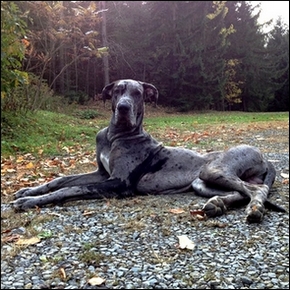'I won't ever tell you what to think; I will only give you the evidence and let you decide for yourself.' - Celia
Part Two:
Previously I discussed reasons why we believe what our parents tell us to be true; in this segment we'll begin to examine the constant struggle for survival, and how tiny changes over time can result in speciation (the evolution of a new species).
Speciation might sound complex, and it is, but once explained it should be quite simple to grasp. We all know that animals inherit traits from their parents; physically, emotionally, and intellectually. You might have inherited your mother's looks and your father's personality, or a mixture of both. You can also inherit attributes from your grandparents and great-grandparents, but did you know that each human being has around 100 new mutations? These 100 mutant points of DNA are entirely unique to you. You didn't get them from either of your parents, and it's almost impossible that your brothers or sisters will have the same mutations.
Now don't freak out, these mutations are most often neutral. It might be simply that your toes will grow much slower than anyone else. Or maybe your eyes are a shade of green that no one else has ever had in your family. Each one of the 100 points will most likely be such a tiny little mutation that you won't even notice it's there. If you're someone who is unconvinced of evolution because you think it all takes millions of years and that we have no proof - this is one example of microevolution, and it occurs right in front of our eyes within a single generation.
It is these tiny changes which may help certain animals in the race for survival. Just the slightest change will make them a fraction more capable of surviving and producing young. Once they produce offspring, they have successfully passed on that mutation to their youngsters, and therefore succeeded at life. I'm talking about natural selection. The natural world only has resources for a certain amount of animals, and as sad as it may be, the majority of wild animals will not survive into adulthood and sexual maturity. It is these slight mutations which will mean one antelope survives longer than its brother. It might have been able to run just a little bit faster due to a genetic mutation which caused it's legs to be slightly longer. These sorts of tiny changes often effect whether or not they will have the opportunity to pass their genes on.
I often have people asking 'If evolution is real, why isn't it still happening? Why don't we see new species all the time?' This is a complicated question. The basic answer to it is that evolution is still happening. In fact, since the dawn of man we have seen the rise of a new species. Most importantly, we more or less 'created' the species ourselves. Man's best friend - the faithful dog. The domestic dog (Canis lupus familiaris) has only been around for a maximum of 30,000 years. That might seem like a long time in our eyes, but by evolutionary standards it's a very short time indeed. There has not been a fossilised dog found earlier than that. If evolution wasn't real, then we would be able to find dog fossils in every single sedimentary layer of the Earth for as far back as we can look. The only explanation is that they descended from another species; the grey wolf (Canis lupus).
If you're still a little sceptical, you only have to think about how we have selectively bred dogs since then, into different breeds. Look at the difference between a Pug and a Great Dane, this could also be considered microevolution. True, they are still the same species, but imagine if we kept them apart for just another 10,000 years. With every single generation adding 100 new mutations, and without the two breeds 'joining' their genetic code any more; don't you think it is conceivable that after long enough their DNA would be so different that they could no longer breed and produce fertile offspring?


A good example of two species which have only very recently separated is the horse and the humble donkey. Most people know that if a horse and a donkey get jiggy you get a mule. Mules can be male or female but they are unable to reproduce. This is essentially what defines a species: the ability for two living things to produce fertile offspring. Although the genetic code of horses and donkey is still very similar (so similar that they can still interbreed); they are different enough genetically that they cannot produce a viable youngster.
In the next segment of this series I will move towards discussing dating methods and the evidence of how old fossils really are. Later on we might delve a little closer into genetics. If you have any particular part of evolution that you would like me to cover please leave a comment.
Throughout this series I will endeavour only to open minds to new ideas. If you are religious, I encourage you to keep your faith, if that is what you would like to do. My only aim is to encourage a healthy understanding of this commonly misunderstood scientific theory.
Stock images courtesy of Tea To Stock & Regu 102.